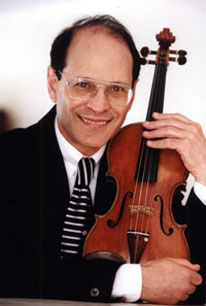|
Symphony
SRS SEASON ENDS WITH RESOUNDING TA-TA-TA-BANG
by Terry McNeill
Sunday, June 1, 2025
Symphony
YOUTHFUL VIRTUOSITY ON DISPLAY AT USO'S MAY CONCERTS
by Peter Lert
Saturday, May 17, 2025
Symphony
MYSTICAL PLANETS AND LIVELY GERSHWIN ORTIZ AT FINAL SRS CONCERT
by Peter Lert
Sunday, May 4, 2025
Symphony
VSO'S CONCERT MUSIC OF TIME, MUSIC OF PLACE
by Peter Lert
Sunday, April 27, 2025
Choral and Vocal
VOCAL ELEGANCE AND FIRE AT THE 222'S RECITAL APRIL 26
by Pamela Hicks Gailey
Saturday, April 26, 2025
CANTIAMO SONOMA SINGS AN INSPIRED GOOD FRIDAY MOZART REQUIEM CONCERT
by Pamela Hicks Gailey
Friday, April 18, 2025
DRAMATIC SHOSTAKOVICH SYMPHONY CLOSES PHILHARMONIC'S 25TH SEASON
by Terry McNeill
Sunday, April 13, 2025
LARGE COLLEGE OF MARIN AUDIENCE GREETS STOPHER ARTISTRY
by Terry McNeill
Saturday, April 5, 2025
Chamber
FRISSON DELIVERS SHIVERS OF DELIGHT
by Abby Wasserman
Sunday, March 30, 2025
OLD AND MOSTLY NEW IN SRS MARCH CONCERT IN WEILL
by Peter Lert
Saturday, March 22, 2025
|
 |
 Violinist Joseph Gold |
NEW FALCON'S IMPRESSIVE VALLEJO CONCERT DEBUT
by James Roy MacBean
Sunday, March 6, 2016
The New Falcon String Quartet gave its debut performance March 6 under the aegis of Vallejo Symphony Orchestra in Vallejoís First Presbyterian Church.
Formed only five weeks earlier, arising phoenix-like out of the ashes of another group, which was to bear the name Peregrine Quartet, and New Falcon now comprises musicians who have performed at the Mendocino Music Festival. The Quartet consists of violinists Joseph Gold and Dan Kristianson, Raphael Gold on viola, and cellist Burke Schuchmann. All are experienced performers as members of San Francisco Bay Area symphonies.
The program included Mozartís Divertimento in F Major, K. 138, Mendelssohnís String Quartet in E minor, Op. 44, No. 2, and DvořŠkís String Quartet in F Major, Op. 96, ďAmerican.Ē Opening the program was the Divertimento, written weeks after Mozart returned to Salzburg with his father in December 1771. The third Divertimentoís two outer movements are fast-paced and feature Mr. Goldís virtuosity, but whose tone seemed occasionally shrill. The middle or second movement is a slow Andante and a fine interplay and exchange of leading phrases between violin and cello. This lovely Andante failed to flow smoothly, and it risked bogging down in all-too slow tempos. By contrast, the two brisk outer movements were noteworthy for fine ensemble and taut execution.
Mendelssohnís four-movement work was written in 1837 and opened with an extended elaboration of themes the composer would later use in his E Minor Violin Concerto. It began with Mr. Kristianson sounding out the first theme in the low range of his instrument, and later there were pungent pizzicato plucking by Mr. Schuchmann. In the succeeding Scherzo the first violin played quite high in its register. A lovely Andante followed, introduced by viola, violin and the cello. When the additional violin entered, it played a sweetly sentimental melody over the bass. The final movement (Presto Agitato) began with an all-out attack, followed by more cello pizzicato. A lilting final phrase was deftly developed and lead to a rousing tutti finale.
Following intermission DvořŠkís iconic F Major Quartet was heard. The work was written in 1893 while DvořŠk was living in the Czech-American farming community of Spillville, Iowa. Traces of American spirituals or Native American rhythms may or may not be found in this work, but the composer himself noted that Haydnís music was much on his mind at this time, and as a consequence he wrote straightforward melodic lines, much to the popular success of this work. The opening viola theme featured Raphael Goldís burnished sound. The Lentosecond movement opened with shimmering violins over pizzicato cello, and soon Mr. Schuchmann gracefully stated the principal theme.
The final movement is a gay rondo and proceeded rapidly to a brisk conclusion with unexpected modulations through related and sometimes remote keys. There was no encore.
On balance the New Falconís concert was an impressive debut.
|
